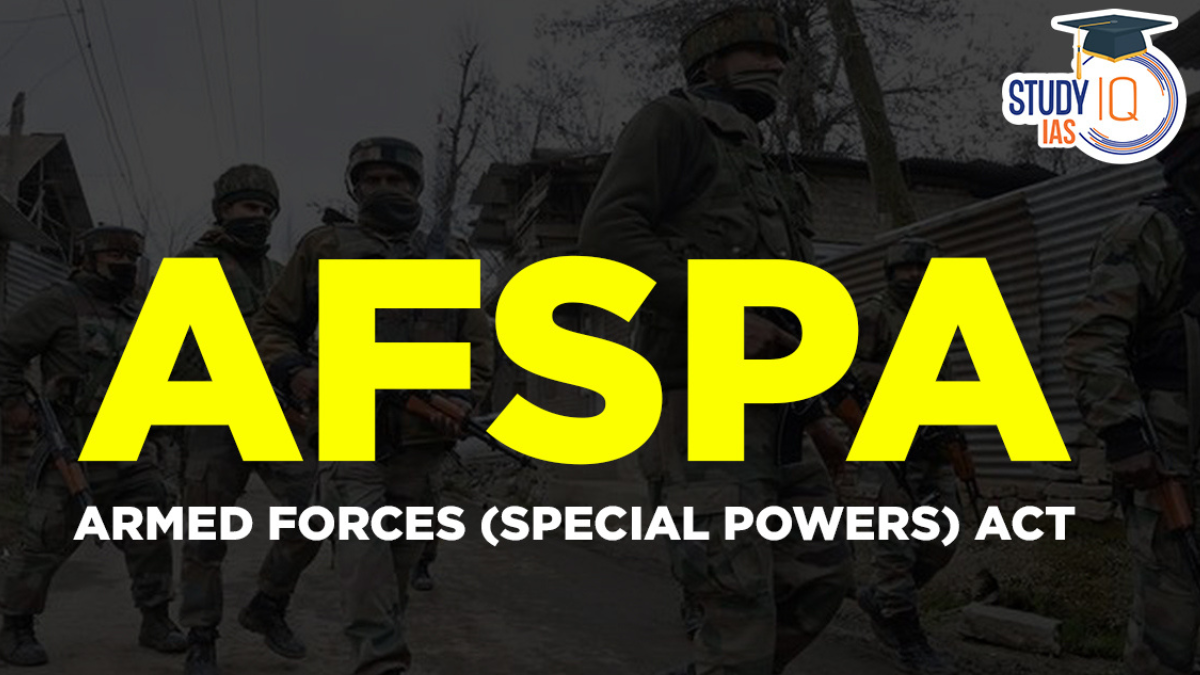Table of Contents
About the Armed Forces Special Powers Act (AFSPA), 1958
- It is an act of the Parliament that grants special powers to the Indian Armed Forces to maintain public order in “disturbed areas”.
- The main aim of the act is to tackle the secessionist activities in the north-eastern states.
- Origin: The Act in its original form was promulgated by the British in response to the Quit India movement in 1942.
- After Independence, the act was retained, first brought in as an ordinance and then notified as an Act in 1958.
- The initial aim of the AFSPA was to overcome the Naga movement. Later, it was extended to other disturbed areas in the country.
- The Act is enforced by the Ministry of Home Affairs.
- Disturbed Area: A disturbed area is declared under Section 3 of the AFSPA.
- An area can be disturbed due to differences or disputes between members of different religious, racial, language or regional groups or castes or communities.
- The Union Government or the Governor of the State or administrator of the Union Territory can declare the whole or part of the State or Union Territory as a disturbed area.
- The MHA issues periodic “disturbed area” notification to extend the AFSPA only for Nagaland and Arunachal Pradesh.
- The notification for Manipur and Assam is issued by the State governments.
- Current status of its imposition:
- The AFSPA is currently active in the states of Assam (some districts), Arunachal Pradesh (some districts), Manipur (entire state except for Imphal municipal area), Nagaland (some districts), and the UT of Jammu & Kashmir (entire UT).
- It was completely withdrawn in Meghalaya in 2018, Tripura in 2015 and Mizoram in the 1980s.
- Powers under AFSPA:
- Firing: The armed forces and the Central Armed Police Forces deployed in specified “disturbed areas” can fire and kill anyone acting in accordance with law.
- Arrest and detention: Arrest anyone based on suspicion, without a warrant. Individuals arrested and taken into custody under this act have to be handed over to the officer in charge of the nearest police station.
- Search: Security forces can search any premises without a warrant. They can stop and search any vehicle based on suspicion.
- Protection from prosecution: Security forces are given protection from prosecution and legal suits. The Central government’s sanction is required for prosecution.
- Destruction: Destroy any arms dump, hide-outs, fortified shelter from which armed attacks are carried out.
- Judicial review: There shall not be any judicial review of the government’s judgment on why an area is found to be disturbed.
| Success of AFSPA So Far |
|
Criticism of AFSPA
- Alienating people of north-east: The use of force to overcome popular movements has further alienated people of north-east. Many families have lost their loved ones to military actions. People of the region feel alienated from India.
- Violation of human rights: India’s judicial organs and other international groups have described AFSPA as a symbol of oppression. There are widespread instances of extended custody and torture by the security forces. Innocents have suffered under the draconian law.
- Misuse by armed forces: Security forces have used the law for their own personal benefits. There were instances of them carrying out kidnapping and extortion under the protective veil of AFSPA.
- Encroaching upon the powers of the state governments: Security personnel operating in AFSPA areas work parallel to the state security forces. Their actions sometimes encroach upon the jurisdiction of state security agencies.
- Violation of International Law Documents: Many experts argue that AFSPA contradicts several international legal documents, including:
- Universal Declaration of Human Rights
- International Covenant on Civil and Political Rights (ICCPR)
- Convention Against Torture
- Customary law principles from:
- UN Code of Conduct for Law Enforcement Officials
- UN Body of Principles for the Protection of All Persons Under Detention
- UN Principles on Effective Prevention and Investigation of Extra-legal, Arbitrary, and Summary Executions
|
Important Information |
|
| Incidents of misuse of AFSPA Law |
|
Judicial Pronouncements on AFSPA
- Naga People’s Movement of Human Rights vs. Union of India (1998): The Court held that the act cannot be considered as violative of the Constitution and the powers conferred under the Act are not arbitrary and unreasonable and therefore not in violation of the provisions of the Constitution.
- However, the court held that the army personnel are required to strictly follow minimum force under Section 4 against suspected of violating prohibitive orders.
- Also, the act has to be reviewed every six months by the state.
- July 2016 judgement: The Supreme Court directed the armed forces and police not to use “excessive or retaliatory force” in even areas declared ‘disturbed’ where the AFSPA is applicable.
- July 2017 judgement: Supreme Court’s judgement on alleged unlawful encounter killings in Manipur marked an important institutional step.
- The Supreme Court overruled the objections of the Centre and the Army and ordered the Central Bureau of Investigation to set up a special investigation team to probe encounter deaths.
Recommendations By Various Committees
- B P Jeevan Reddy Committee (2005): The committee was also of the view that the act is inadequate in several provisions. The committee also said that the law must be reviewed and security forces must be brought under the purview of ordinary criminal law rather than under army law.
- Santosh Hegde committee (2013): The committee was of the view that if greater power was given then greater would be the restraint and stricter would be the mechanism to prevent its misuse or abuse.
- The 5th report of the Second Administrative Reforms Commission on public order has also recommended the repeal of the AFSPA.
Way Forward
- Building Trust and Community Involvement: The armed forces should actively engage with the local population and work towards building trust and understanding.
- Ensuring justice for victims: It is important for the security forces and the government to expedite pending cases and establish a transparent process to address allegations of human rights violations by the forces.
- Strengthening local law enforcement: State governments should focus on strengthening the local law and order machinery.
- If the local police can effectively handle security situations, the need for AFSPA might diminish, allowing for its withdrawal from the region.
- Case-by-case application: The government should consider implementing and lifting AFSPA on a case-by-case basis, limiting its application to specific districts facing significant disturbances rather than applying it to the entire state.
- Restoring normalcy and development: It is crucial to restore normalcy in the region for India to fulfill its Act East policy and leverage the Northeast as a gateway to Southeast Asia.
- Demilitarisation and addressing the underlying issues can contribute to long-term stability, allowing for the region’s socio-economic development.


 Serious Fraud Investigation Office (SFIO...
Serious Fraud Investigation Office (SFIO...
 Article 142 of Indian Constitution, Sign...
Article 142 of Indian Constitution, Sign...
 Pakistan-Occupied Kashmir (PoK): History...
Pakistan-Occupied Kashmir (PoK): History...





















